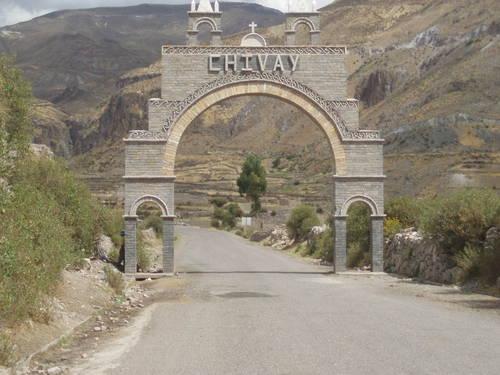Caylloma, Arequipa, Peru
Suggest Place to Visit
1308
Track to location with GPS |
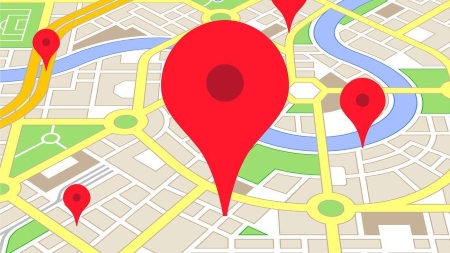 |
Caylloma is one of the oldest silver mines in Peru, it has been known since the Inca period and has been worked almost continuously since colonial times from 1541 to date. References indicate that large amounts of mineral were extracted during the colonial period.
Chivay is the capital of the Caylloma Province. The city of Chivay is divided into 3 zones which are called: Ccapa, Urinsaya, Hanansaya.
There are the thermal baths of ´´La Calera´´. It is a great attraction visited by thousands of tourists a year.
Wititi or Wifalda
It is one of the native dances of the towns of the Colca Canyon, Caylloma. This dance represents the story of a young man in love with a young woman from a rival region and, not being able to get close to her, he takes advantage of the festivities and disguises himself as a woman in order to abduct her later.
TOURIST ATTRACTIONS:
¨COLCA CANYON: The Colca is a natural wonder located in the Province of Caylloma (Department of Arequipa). Due to its 3,180 meters deep, it is considered the second deepest canyon in the world. To visit it, you will have to travel about 30 km from the town of Chivay.The region has a geography of rugged and particular beauty, with this huge crack cutting the landscape, surrounded by the Volcanic Mountain Range and from where you can see the snow-capped peaks of the Ampato volcanoes ( 6,310 masl) and Coropuna (6,426 masl).
THE COLCA VALLEY
The Colca Valley, about 100 km long, occupies only one sector of the Colca River basin between the districts of Callalli and Huambo. The altitudes along the valley are highly variable, with its highest point at the top of the Ampato Volcano, at 6,310 meters above sea level, and the lowest at the confluence of the Colca and Andamayo Rivers, at 970 meters above sea level. the South American tectonic plate, therefore it is presented as a very active area from the geological point of view. It also houses the Hualca-Hualca volcanic massif and the Ampato and Sabancaya volcanoes, the latter in activity. In the area are scattered a series of towns whose foundation dates back to colonial times and which are inhabited by the descendants of the Collaguas and Cabanas ethnic groups, who have managed to preserve their rich cultural tradition. The inhabitants of the valley still use the terraces system bequeathed by their ancestors and used for hundreds of years. Although all the towns offer a great variety of attractions for the visitor, the most visited towns are Chivay and Cabanaconde. From the latter you will reach the Mirador de la Cruz del Cóndor, where you will have a spectacular view of the valley and the canyon but mainly of the flight of the Condor. The upper part of the valley, comprised by the Districts of Callalli, Sibayo, Tuti and Canocota, has as its main economic activity cattle, sheep and South American camelid farming, although it is mainly directed to self-consumption. The middle part of the valley, being the largest area, has a more developed agriculture aimed at self-consumption and marketing. Among the main crop products are potatoes, corn, beans, alfalfa, wheat and barley. This area is made up of the Districts of Chivay (capital of the Caylloma Province), Yanque, Achola, Maca, Coporaque, Ichupampa, Lari and Madrigal. It is in this part of the valley where we find large areas that use terraces systems. Cabanaconde, Huambo and Tapay are the districts that make up the lower part of the valley. Its economic activities are also directed to agriculture, only in this case to the cultivation of fruit trees.Among the main places that you should visit are: La Calera Hot Springs: This complex, administered by the municipality of Chivay, has several pools of thermomedicinal waters with high content of sulfur and iron, which help in the treatment of diseases such as rheumatism and arthritis. They are located approximately 5 minutes from the city.Churches in the Colca Valley: The Colca Valley offers its visitors a journey through the history of the region. In addition to the customs and traditions that have remained in the way of life of its inhabitants, it is also possible to travel back in time with visits to the beautiful churches that date back to the colonial era. Among the main ones we have: On the left bank of the river: Iglesia Nuestra Señora de la Asunción de Chivay: It has a beautiful baroque altarpiece from the 17th century, a tabernacle dating from the 16th century and several wall paintings among which are representations of the Apostles and the Baptism of Christ, painted between the 17th and 18th centuries. Chivay is located 150 km from Arequipa. Church of the Immaculate Conception of Yanque: A beautiful example of mestizo baroque, it is believed that its construction dates back to the year 1690. It has a series of polychrome neoclassical altarpieces and a silver processional cross from the century XVI. It is located in the main square of the district, about 10 km from Chivay. Church of Santa Ana de Maca: It has a beautiful facade adorned with arches, inside it preserves beautiful Baroque altars, the tabernacle and an image of the crucified Christ dating from the 16th century. Maca is a town located on the slopes of the Sabancaya Volcano and the snowy Hualca-Hualca, 23 km west of Chivay. Church of San Sebastián de Pinchillo: Inside you can appreciate beautiful and colorful Renaissance and Baroque altarpieces, as well as the painstaking work of one of its doors that simulates a giant altarpiece, contributing to the fame of the town, known for the elaboration of beautiful altarpieces in miniature. Pinchillo is located 27 km from Chivay. Church of San Pedro Alcántara de Cabanaconde: A beautiful building built in wood in the seventeenth century, it has imposing neoclassical façades. Inside there are some images of the crucified Christ and the coronation of the Virgin dating from the 18th century, as well as a collection of paintings from the Cusco School. This town marks the beginning of the Cabana towns, it is located 65 km from Chivay. On the right bank of the river: Church of Santiago Apóstol de Coporaque: It is the oldest religious building in the Colca Valley. Its façade shows a marked Italian Renaissance style from the 16th century. Inside, vestiges of the old high altar are preserved, as well as beautiful images from the 16th century that represent the Coronation of the Virgin, the Virgin of Candelaria, Santa Ursula, La Dolorosa and San Antonio Abad, among others. Coporaque is located 8 km west of Chivay. Iglesia de la Purísima Concepción de Lari: It is the largest church in the valley for what is called the "Cathedral of Colca". It was built in the middle of the s. In the 18th century, there is a set of polychrome altars, a magnificent pulpit and a beautiful statue of the Immaculate Conception, as well as beautiful examples of mural painting. Lari is located 27 km west of Chivay Church of Santiago de Madrigal: It is one of the oldest churches in the Colca Valley, built at the end of the 16th century, a beautiful example of colonial architecture. Madrigal is located 50 km west of Chivay.
Comments
We don´t have yet any comments about:
Chivay city
Chivay city
Be the first to leave a comment as it is very important to inform other people
Outros locais a visitar
Within a radius of 20 km from:Chivay city
Spa La Calera |
| 0,5 Km |
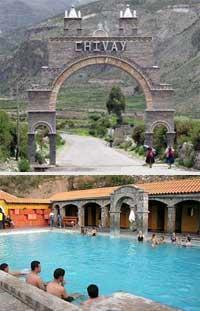 |
Coporaque, capital histórica de La Kaci National |
| 5,8 Km |
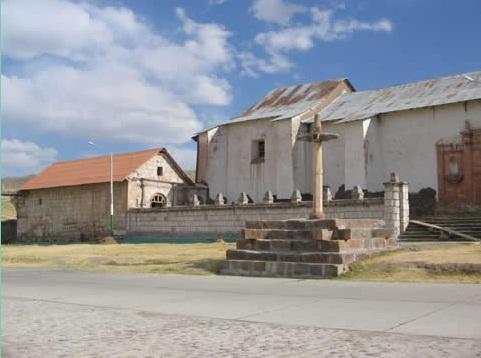 |
Igreja de Yanque - Arequipa |
| 6,3 Km |
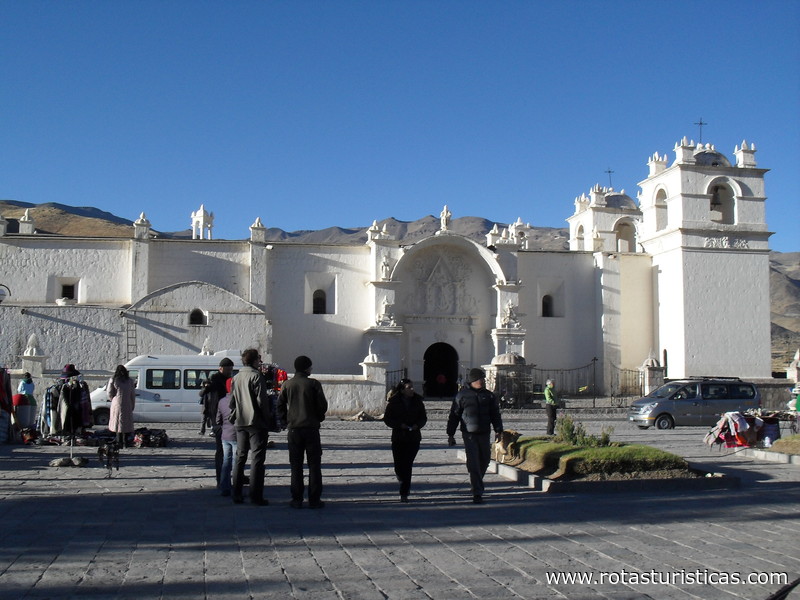 |
Hotel reservation near Chivay city within a radius of 20 km
Why to book with Clube Net
The best prices
Our partnerships with the world´s largest operators offer research on the best market prices.
More options
At Rotas Turisticos you can book the hotel, buy the air ticket, book the transfer from the airport to the hotel and vice versa, book the local excursions, rent the car, take travel insurance and consult the places to visit and where to go.
Holiday Tips & Destinations
Hundreds of holiday destinations with all the options that allow you to easily choose the destination that best suits your dream vacation.
Clube Net
Links


